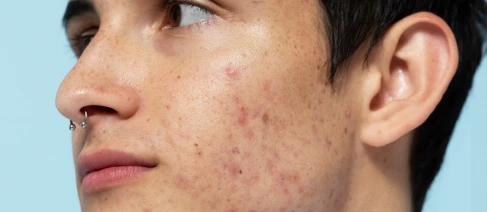
Active acne breakouts are irritating, but the stubborn scars that acne leaves are even more frustrating. Acne scars are dermal scarring due to the loss of collagen caused by the inflammation of acne. Just like our skin gets scarred after a trauma or surgery, the skin heals by scarring if acne is left untreated.
Acne scars are mainly categorized into atrophic and hypertrophic scars.
Atrophic Scars
They are the most common type of scars. There are 3 types of atrophic scars:
Hypertrophic Scars
They are commonly formed at the chest, back & shoulders. People who have dark skin tones are more likely to get these types of scars.
There is a common myth that touching acne leads to scarring. However, the healing of acne could get delayed on touching it. The main reason for scarring is when the acne is left untreated for a long time. The severity of the scar depends on the severity of acne caused.
When the acne is not treated it penetrates the skin deeply resulting in damage to the skin and the tissue beneath it. When the acne gets cleared, the body tries to repair the damage caused.
During this process, the body produces collagen. The formation of scars depends on the amount of collagen produced during this process.
The longer an acne persists, the deeper the scar gets. Hence treating the acne early and making the lesions heal faster prevents deeper scarring. Many people who treat acne religiously do not even require treatment for acne scars.
Oral treatments reduce the inflammation and induce healthy collagen formation, resulting in less fibrosis and scarring.
Keeping the skin hydrated and consuming vitamin C also improves the quality of collagen. Keeping the skin protected by sun reduces collagen damage and improves cosmetic appearance of scars.
The best time to seek treatment for acne scars is when they are immature. Immature acne scars are red in color and have an ample amount of blood supply to heal well. The more mature or white scar becomes, the harder it is to treat.
The two most effective ways of treating acne scars is by:
Ablative resurfacing removes the outermost layer of the skin. It can treat deep scars.
Non-ablative resurfacing heats the cells in dermal layers to help them produce new collagen.
Microneedling delivers active molecules to the dermis layer of the skin to form new collagen resulting in the healing of the scar.
The procedure of microneedling involves a sterile single use digital tip which has 12 very fine needles that pierce the skin at a rate of 2000 pricks per second. This induces the body’s healing system to get activated at the site of treatment done.
The cells that enter the treated area lay down new collagen and therefore improve the scar quality.
Also microneedling deposits the active ingredients to the dermis layer of the skin where it stays and improves the skin texture slowly, lasting upto an year or longer.
Mid-deep dermal peels or Chemical reconstruction of skin scars (CROSS) is a technique that helps improve the appearance of acne scars. Regular peels every 15-21 days improve the collagen production and visibility of scars.
The treatment of the acne scars need to be planned according to the age, lifestyle, type of acne & its severity.
For someone with an indoor lifestyle, ample time but budget limits, laser resurfacing, TCA CROSS, chemical peels are good options.
For a person with indoor lifestyle but not much time at hand for downtime and doesn’t have a deadline for results, microneedling, non ablative laser resurfacing, PRP, GFC therapy works great. For a person who is on a deadline and wants the results quick, dermal fillers & threads are the options.
If you are looking for the acne scar treatment in Ludhiana, then visit The Glo Medispa Skin Clinic.
They have all the advanced technologies to treat acne scars.
Dermal fillers, biore modeling agents, and skin boosters can quickly decrease the appearance of acne scars.
Injecting platelet rich plasma into dermis stimulates various growth factors in the skin. These growth factors improve the blood supply to the skin. The collagen synthesis also increases by these growth factors. The benefit of plasma is that it can be combined with any treatment for acne scars and has no downtime.
Fibroblast therapy is done using a plasma pen. The air between the tip of a pen and the skin gets charged with plasma energy.
This plasma energy stimulates fibroblast proliferation in the dermis layer of the skin. These fibroblasts lay down new collagen which matures over 3-6 months. Fibroblast therapy helps to tighten the skin and reduce acne scars.
People confuse ice pick acne scars with open pores.
Open pores are the dilated oil gland openings over nose, cheeks, forehead, whereas ice pick scars are the pitted scars left by acne lesions. Both can be treated by laser resurfacing, carbon facial, and microneedling.
It is next to impossible to improve acne scars with facials.
Facials rarely make a difference in appearance of scars as they do not involve laser devices.
The serums or creams used in facials only penetrate upper layers of epidermis and can be beneficial for only providing hydration to the skin. These do not induce collagen in the dermis.
For the results to stay long, aftercare of the scars and the skin is really important. Some of the tips are mentioned below:
To know about acne scar treatment cost in Ludhiana, or any other queries, feel free to reach us.
 Gurgaon
Gurgaon